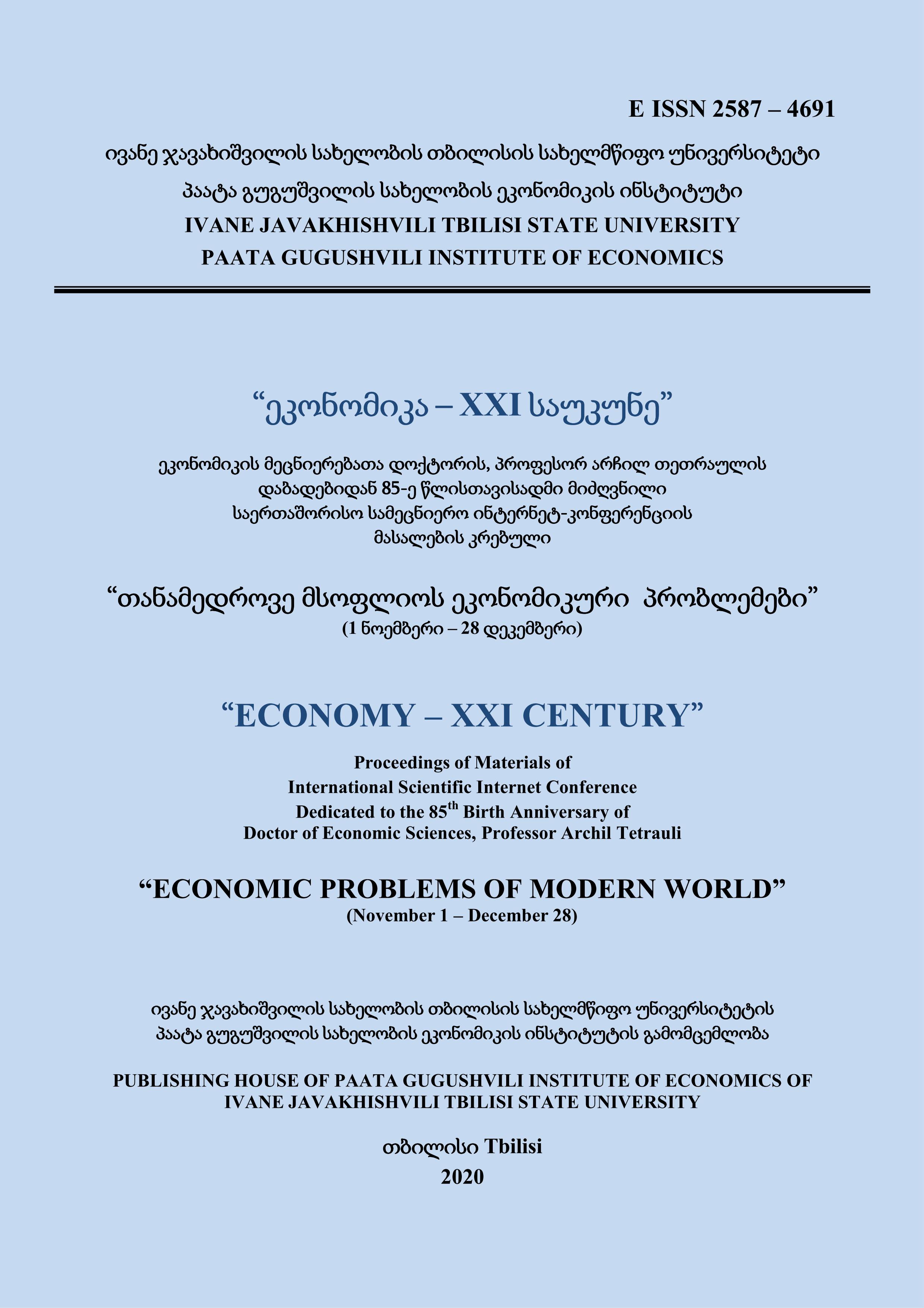სახელმწიფოს ეკონომიკური უნარის თავისებურებები COVID-19-ის პანდემიის პირობებში
ანოტაცია
სტატიაში განხილულია სახელმწიფოს ეკონომიკური უნარის, როგორც წარმოების დამოუკიდებელი ფაქტორის თავისებურებები COVID-19-ის პანდემიით გამოწვეული ეკონომიკური კრიზისის პირობებში. ნაჩვენებია, რომ ამ კრიზისის პირობებში მთავრობათა მიერ გატარებული ანტიკრიზისული პროგრამები საბოლოო ჯამში ხელ უწყობს ეკონომიკის ზომბირებას, რაც სახელმწიფოს ეკონომიკური უნარისთვის პრინციპულად მიუღებელია. პოსტპანდემიურ პერიოდში გამწვავდება დაპირისპირება სახელმწიფოს ეკონომიკურ უნარსა და სახელმწიფოს იმ ფუნქციას შორის, რომელიც პოლიტიკურ პროცესებს წარმართავს. ეკონომიკური წინსვლისთვის განსაკუთრებული მნიშვნელობა ექნება იმას, თუ რამდენად შეძლებს სახელმწიფოს ეკონომიკური უნარი, დაძლიოს სახელმწიფოს მიერ პოლიტიკური პროცესების წარმართვის ინტერესები, რომლის მიზანიცაა ამომრჩეველთა მხარდაჭერის შენარჩუნება და გაზრდა.
წყაროები
Ahearne A. G., Shinada N., 2005. “Zombie Firms and Economic Stagnation in Japan.” International Economics and Economic Policy, Vol. 2, No. 4.
Anderson R. E., 2004. Get Out of the Way: How Government Can Help Business in Poor Countries. Washington, DC, CATO Institute.
. . .
Papava V., 1993. „А New View of the Economic Ability of the Government, Egalitarian Goods and GNP“ International Journal of Social Economics, Vol. 20, No. 8.
Papava V., 1994. “The Role of the State in the Modern Economic System.” Problems of Economic Transition, Vol 37, No 5.
Papava V., 2010. “The Problem of Zombification of the Postcommunist Necroeconomy.” Problems o fEconomic Transition, Vol 53, No 4.
l9. Papava V., 2017a. “On Production Factors.” Bulletin of the Georgian National Academy of Sciences, Vol ll No. 4.
Papava V., 2017b. “Retroeconomics — Moving from Dying to Brisk Economy.” Journal of Reviews on Global Economics, Vol. 6, <http://www.1ifescienceglobal.com/independent-joumals/joumal-of-reviews-on-global-economics/volume-6/85-abstract/jrge/2929-abstract-retroeconomics-moving-from-dying-to-brisk-economy>
Papava V., 2019. “On the NonEconomic Policy and the PostCommunist Experience of Georgia.” European Journal of Economic Studies, Vol. 8, Issue 2, <http://ejouma12.com/joumals_n/l 573764064.pdf>.
Papava V., 2020a. “Coronomic Crisis: When the Economy Is a Hostage to Medicine.” Eurasia Review, March 29, <https://www.eurasiareview.com/29032020-coronomic-crisis-when-theeconomyisahostagetomedicineoped/>
Papava V., 2020b. ,,Features of the Economic Crisis Under the COVID19 Pandemic and the Threat of the Zombieing of the Economy.“ Bulletin of the Georgian National Academy of Sciences, Vol. 14, No. 3, No 2.
Papava V., 20200. “On the Atypical Economic Crisis Under the COVID19 Pandemic.” Economics and Business, No. 4.
Quiggin J ., 2010. Zombie Economics. How Dead Ideas Still Walk Among Us. Princeton, Princeton University Press.
Roach S. S., 2020. “The Pandemic’s Long Economic Shadow.” Project Syndicate, December 21, <https://www.proj ect-syndicate.org/commentary/pandemics-long-economic-shadow-by-stephen-s-roach-2020-12>.
Scheidel W., 2020. “The Spanish Flu Didn’t Wreck the Global Economy. What Is Different About the CoronaVirus Pandemic?” Foreign Aflairs, May 28, <https://www.foreignaffairs.com/articles/united-states/2020—05-28/spanish—flu-didnt—wreck-global- economy>
Stiglitz J. E., 2001. “Bankruptcy Laws: Basic Economic Principles.” In Resolution of Financial Distress: An International Perspective on the Design of Bankruptcy Laws. Claessens S., Djankov S., Mody A., eds. Washington, DC, The World Bank.
Stiglitz J. E., Rashid H., 2020. “Which Economic Stimulus Works?” Project Syndicate, June 8, <https://www.project-syndicate.org/commentary/stimulus—policies-must-benefit-real-economy-not—financial-speculation—by-joseph—e-stiglitz—and-hamid—rashid-2020-06?utm_source=Proj ect+Syndicate+News1etter&utm_campai gnc4 1 ee7287a-sunday_newsletter_l4_06_2020&utm_medium=email&utm_term=0_73bad5b7d8—c41ee7287a-93567601&mc_cid=c41ee7287a&mc_eid=e9fb6cbccO>.
Ullman H., 2020. “Economic Recovery from Coronavirus: Lessons from 1918—1923.” Atlantic Council, May 1, <https://www.at1anticcouncil.org/blogs/new-atlanticist/economic-recovery-from-coronavirus-lessons-irom-1918-1923/>.
Wallace I, Pilkington C., 2019. “Restructuring Across Europe — A New Era?” White & Case, January 25, <https://www.whitecase.com/publications/alert/restructuring—across—europe—new-era>.
White M. J ., 2001. “Bankruptcy Procedures in Countries Undergoing Financial Crises.” In Resolution of Financial Distress: An International Perspective on the Design of Bankruptcy Laws. Ed. by S. Claessens, S. Djankov, Mody A. Washington, DC, The World Bank.
Zakaria F., 2020. Ten Lessons for a Post-Pandemic World. New York, W. W. Norton & Company.

